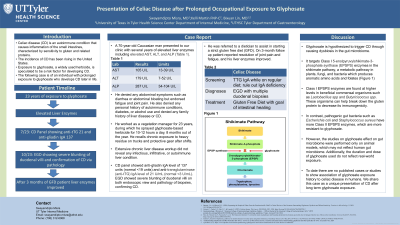Sunday Poster Session
Category: Small Intestine
P1536 - Presentation of Celiac Disease after Prolonged Occupational Exposure to Glyphosate
Sunday, October 27, 2024
3:30 PM - 7:00 PM ET
Location: Exhibit Hall E

Has Audio
- SM
Swayamdipto Misra, MD
University of Texas Health East Texas Physicians
Tyler, TX
Presenting Author(s)
Swayamdipto Misra, MD1, Kelli K. Martin, NP2, Bixuan Lin, MD3
1University of Texas Health East Texas Physicians, Tyler, TX; 2University of Texas, Troup, TX; 3University of North Texas Health Science Center, Tyler, TX
Introduction: Celiac disease (CD) is an autoimmune condition that causes enteropathy, characterized by sensitivity to gluten and related proteins. The incidence of CD has been rising in the United States. Exposure to glyphosate, a widely used herbicide, is speculated to be a risk factor for developing CD. The following case is of an individual with prolonged exposure to glyphosate who develops CD later in life.
Case Description/Methods: A 70-year-old Caucasian man presented to our clinic with several years of elevated liver enzymes including AST 105, ALT 179, ALP 287. He denied any gastrointestinal symptoms. He also denied any personal history of autoimmune conditions, diabetes, or alcohol use and denied any family history of liver disease or CD. He worked as a vegetation manager for 23 years, spraying glyphosate-based herbicide for 10-12 hours a day, 8 months a year. Despite consistently wearing adequate protective equipment provided at work, he was regularly exposed to heavy residue of glyphosate on trucks and protective gear after his shifts. Extensive chronic liver disease workup did not reveal any infectious, infiltrative, or autoimmune liver condition. CD panel showed anti-gliadin IgA level of 137 units (normal < 19 units) and anti-transglutaminase (anti-tTG) IgA level of 21 U/mL (normal < 3 U/mL). EGD showed severe blunting of duodenal villi on both endoscopic view and pathology, confirming CD. He was referred to a dietician to assist in starting a strict gluten free diet. On 3-month follow up his liver enzymes improved.
Discussion: Glyphosate is hypothesized to trigger CD through causing dysbiosis in the gut microbiome. It targets Class I 5-enolpyruvylshikimate-3-phosphate synthase (EPSPS) enzymes that are found at higher levels in beneficial commensal organisms such as Lactobacillus spp and Butyricicoccus spp. These organisms can help break down the gluten protein to decrease its immunogenicity. In contrast, pathogenic gut bacteria such as Escherichia coli and Staphylococcus aureus use more Class II EPSPS enzymes, which are more resistant to glyphosate. However, the studies on glyphosate effect on gut microbiome were performed only on animal models, which may not reflect human gut microbiome. Additionally, the duration and dose of glyphosate used do not reflect real-world exposure.
To date there are no published cases or studies to show association of glyphosate exposure history to celiac disease in humans. We share this case as a unique presentation of CD after long term glyphosate exposure.
Disclosures:
Swayamdipto Misra, MD1, Kelli K. Martin, NP2, Bixuan Lin, MD3. P1536 - Presentation of Celiac Disease after Prolonged Occupational Exposure to Glyphosate, ACG 2024 Annual Scientific Meeting Abstracts. Philadelphia, PA: American College of Gastroenterology.
1University of Texas Health East Texas Physicians, Tyler, TX; 2University of Texas, Troup, TX; 3University of North Texas Health Science Center, Tyler, TX
Introduction: Celiac disease (CD) is an autoimmune condition that causes enteropathy, characterized by sensitivity to gluten and related proteins. The incidence of CD has been rising in the United States. Exposure to glyphosate, a widely used herbicide, is speculated to be a risk factor for developing CD. The following case is of an individual with prolonged exposure to glyphosate who develops CD later in life.
Case Description/Methods: A 70-year-old Caucasian man presented to our clinic with several years of elevated liver enzymes including AST 105, ALT 179, ALP 287. He denied any gastrointestinal symptoms. He also denied any personal history of autoimmune conditions, diabetes, or alcohol use and denied any family history of liver disease or CD. He worked as a vegetation manager for 23 years, spraying glyphosate-based herbicide for 10-12 hours a day, 8 months a year. Despite consistently wearing adequate protective equipment provided at work, he was regularly exposed to heavy residue of glyphosate on trucks and protective gear after his shifts. Extensive chronic liver disease workup did not reveal any infectious, infiltrative, or autoimmune liver condition. CD panel showed anti-gliadin IgA level of 137 units (normal < 19 units) and anti-transglutaminase (anti-tTG) IgA level of 21 U/mL (normal < 3 U/mL). EGD showed severe blunting of duodenal villi on both endoscopic view and pathology, confirming CD. He was referred to a dietician to assist in starting a strict gluten free diet. On 3-month follow up his liver enzymes improved.
Discussion: Glyphosate is hypothesized to trigger CD through causing dysbiosis in the gut microbiome. It targets Class I 5-enolpyruvylshikimate-3-phosphate synthase (EPSPS) enzymes that are found at higher levels in beneficial commensal organisms such as Lactobacillus spp and Butyricicoccus spp. These organisms can help break down the gluten protein to decrease its immunogenicity. In contrast, pathogenic gut bacteria such as Escherichia coli and Staphylococcus aureus use more Class II EPSPS enzymes, which are more resistant to glyphosate. However, the studies on glyphosate effect on gut microbiome were performed only on animal models, which may not reflect human gut microbiome. Additionally, the duration and dose of glyphosate used do not reflect real-world exposure.
To date there are no published cases or studies to show association of glyphosate exposure history to celiac disease in humans. We share this case as a unique presentation of CD after long term glyphosate exposure.
Disclosures:
Swayamdipto Misra indicated no relevant financial relationships.
Kelli Martin indicated no relevant financial relationships.
Bixuan Lin indicated no relevant financial relationships.
Swayamdipto Misra, MD1, Kelli K. Martin, NP2, Bixuan Lin, MD3. P1536 - Presentation of Celiac Disease after Prolonged Occupational Exposure to Glyphosate, ACG 2024 Annual Scientific Meeting Abstracts. Philadelphia, PA: American College of Gastroenterology.
